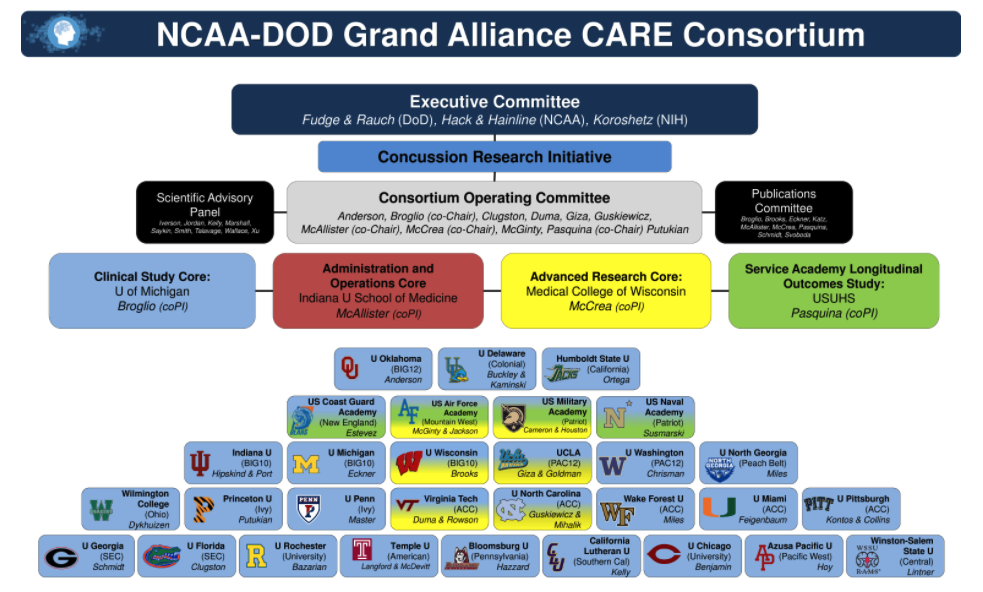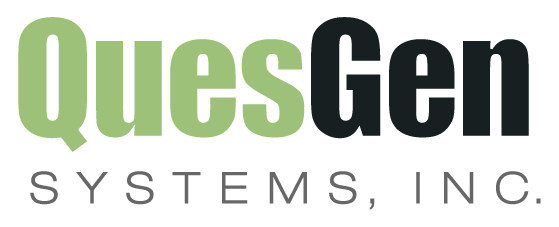Redefining Concussion and Recovery
To inform decisions around concussion concerns, the U.S. DoD (United States Department of Defense) and the NCAA (National Collegiate Athletic Association) established the NCAA–DoD Grand Alliance and the Concussion Assessment, Research and Education (CARE) Consortium. Through this partnership, the consortium is defining the clinical and neurobiological natural history of concussive injury and recovery.
RELATIONSHIP
QuesGen has worked with CARE Consortium for over 7 years.
STUDY SIZE
Over 53,000 patients have been enrolled in this study.
DATA COMPLEXITY
130M+ Data Points and 5,000+ Recorded Concussions
Executive Summary
Concussion is recognized by the U.S. military and the sports medicine community as a major public health concern.
Because of these concussion concerns and its potential long-term consequences, the DoD, U.S. Military Service Academies (MSAs), and national sporting agencies are being pressured to reduce or even eliminate activities that pose an increased concussion risk. As the largest concussion study ever conducted, the CARE Consortium is addressing key knowledge gaps on the six-month natural history of clinical and neurobiological recovery, the acute and sub-acute effects of concussion on brain structure and function, and factors that predict poor outcomes in MSA members and NCAA student-athletes.
QuesGen’s Role:
- Data Systems and Storage
- Study and Data Strategy
- Database Design
- eCRF
- ePRO Setup and Launch Support
Project Goal
Advance the understanding of concussive injuries and recovery.
A Custom, Collaborative Solution for a Longitudinal Data Model
The CARE Consortium knew they needed to find a way to execute on complex longitudinal data collection. They had hundreds of data points that needed to be mapped and analyzed, while keeping in mind the long-term goal of studying the impact of the data across thousands of participants. Not only did they need to find a qualified data management partner, but they also needed one who could successfully meet their size, scope, and complexity.
The overarching goal of the CARE studies is to address pressing public health questions surrounding the immediate, intermediate, and long-term effects of concussion and/or repetitive head impact exposure on neurological health in MSA cadets and NCAA student athletes. As demonstrated by the graphic below, the leaders knew that their database provider and data management team for the study had to be able to organize and effectively manage this complexity.

The CARE Consortium began their search considering a handful of companies, including REDCap, which is a free software solution well-known in the industry. However, the biostatistics team discovered that while the solution was widely used, this initiative needed something more suited for the size, volume, and complexity of the data in this research study (including the multiple collection sites). Because of this, CARE Consortium decided to partner with QuesGen as a more comprehensive database management solution.
Although well-known, the discarded solution was not able to model, collect, and validate the needed complex data structures. According to their team, the solution they considered before QuesGen would crash in a matter of months. Recognizing the mountain of data that lay ahead, they needed confidence moving forward.
“It became very clear, very quickly, that we needed to reach out to someone [to manage the large volume of data] before we could even start the project.”
– Dr. Steven Broglio PhD, ATC
Finding the Right Expertise, Scalability and Dependability
Because the size of the TBI research community is rather small, the CARE Consortium received a number of recommendations for database providers – and QuesGen Systems arose as a top contender based on a successful study they were managing for another TBI research initiative.
This initiative showcased seven years of successful data capture, analysis, and management that served as proof regarding the dependability and reliability of the QuesGen platform.
Additionally, it highlighted the QuesGen team’s proven ability to manage a high volume of complex data and the company’s sheer willingness to create customized solutions that worked for clients, regardless of study size. As a bonus, the CARE Consortium also quickly learned that as a database partner, QuesGen was highly flexible and collaborative – a quality the researchers found very helpful in the design, launch, and management of the project.
“We were always building and refining with QuesGen.”
Building the Data Collection Platform – Step by Step
Since their first meetings, the vision of the NCAA-DoD Grand Alliance and CARE Consortium has been to understand the short and long-term effects of concussion – to advance and redefine its recovery.
To do this, the research has been broken down into phases.
PHASE 1
CARE 1.0 studies ended with approximately 37,000 participants. The aim of CARE 1.0 was to create a national multi-site consortium as a framework to serve the clinical and scientific priorities of the “Concussion Research Initiative” of the Grand Alliance.
Furthermore, CARE 1.0 characterized the natural history and neurobiology of concussion.
PHASE 2
The goal of CARE 2.0 is to characterize the intermediate-term cumulative effects of concussion and/or repetitive head impact exposure during a cadet or student athlete career – examining changes in neurologic health on cognition, psychological health, and life function at the end of the collegiate career. CARE 2.0 leverages the existing CARE dataset of richly characterized student-athletes and cadets both with and without concussions and/or head impact exposure.
PHASE 3
The next phase of the CARE initiative, the CARE SALTOS Integrated (CSI) study, will aim to characterize the long-term effects of concussion and repetitive head impact exposure on brain health. To that end, it will study previous CARE participants up to 10 years after graduation of universities or service academies.
This science has informed better approaches to concussion management… it’s reduced, for instance, the incidents of repeat concussion
– Dr. Michael McCrea, PhD, ABPP
Millions of Data Points and Growing
It’s rewarding to see that the CARE Consortium is visibly improving how clinicians take care of athletes with concussions. The study has encompassed over 53,000 participants to date, more than 130 million data points, and surpassing 5,000 recorded concussions. These findings have been used by the MSAs and the NCAA – whether it’s changing the ‘return to play’ policy or improving concussion management – to make activities safer for everyone.
Furthermore, the CARE Consortium’s work will undoubtedly be applied to concussion management in society at-large. When that kind of impact is on the line, the reliability of your database partner is the last thing that you want to worry about. You want to focus on the science, not the supporting technology. QuesGen is proud to be able to step in as a database partner and CRO experienced in large-scale studies so that their clients can focus on the things that they do best.
The huge accomplishment is generating this database. Now we can really dig in.
Behind the Research: A World-Class Team
QuesGen is proud to serve as a partner for the CARE Consortium, tackling the public health concern brought forth by repeated concussions and brain injuries. The project is made possible by a world-class team of scientists, researchers, data scientists, and more, and is led by four key PIs listed below. To learn more about the CARE consortium and their goal to advance the understanding of concussive injuries and recovery, go to: CARECONSORTIUM.NET

Dr. Thomas W. McAllister, M.D.
Albert Eugene Sterne Professor of Psychiatry, Indiana University School of Medicine

Dr. Michael McCrea, PhD, ABPP
Professor of Neurosurgery and Neurology, Director of Brain Injury Research at the Medical College of Wisconsin, Research Neuropsychologist at the Clement Zablocki VA Medical Center in Milwaukee.

Colonel (Ret.) Paul. F. Pasquina, M.D.
Professor and Chair of the Department of Rehabilitation Medicine and Director of the Center for Rehabilitation Sciences Research (CRSR) at the Uniformed Services University of the Health Sciences (USUHS), Chief of the Department of Rehabilitation at Walter Reed National Military Medical Center.

Steven Broglio, PhD
Professor of Kinesiology, Neurology, and Physical Medicine and Rehabilitation; Associate Dean of Graduate Affairs; and Director of the Michigan Concussion Center at the University of Michigan.
